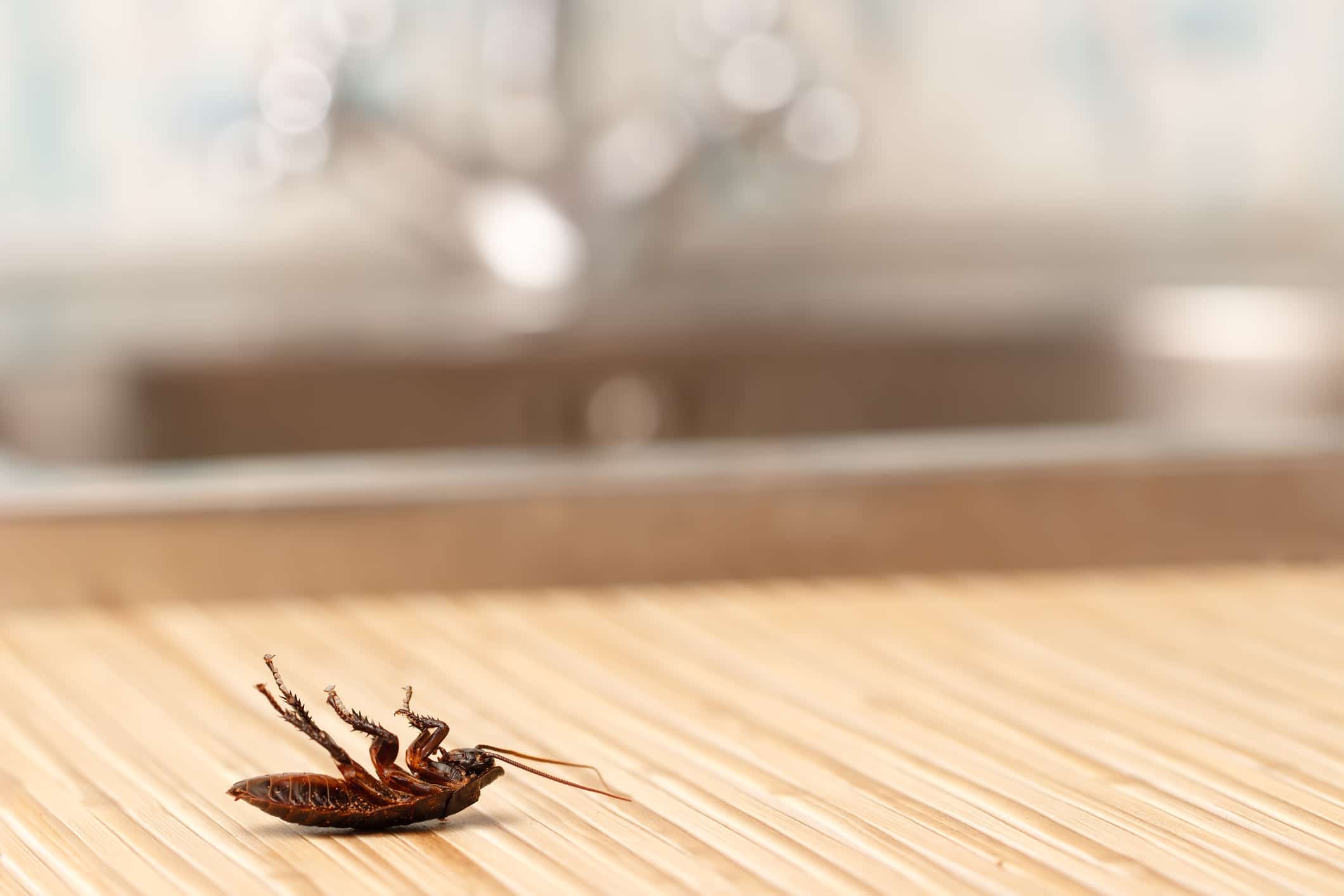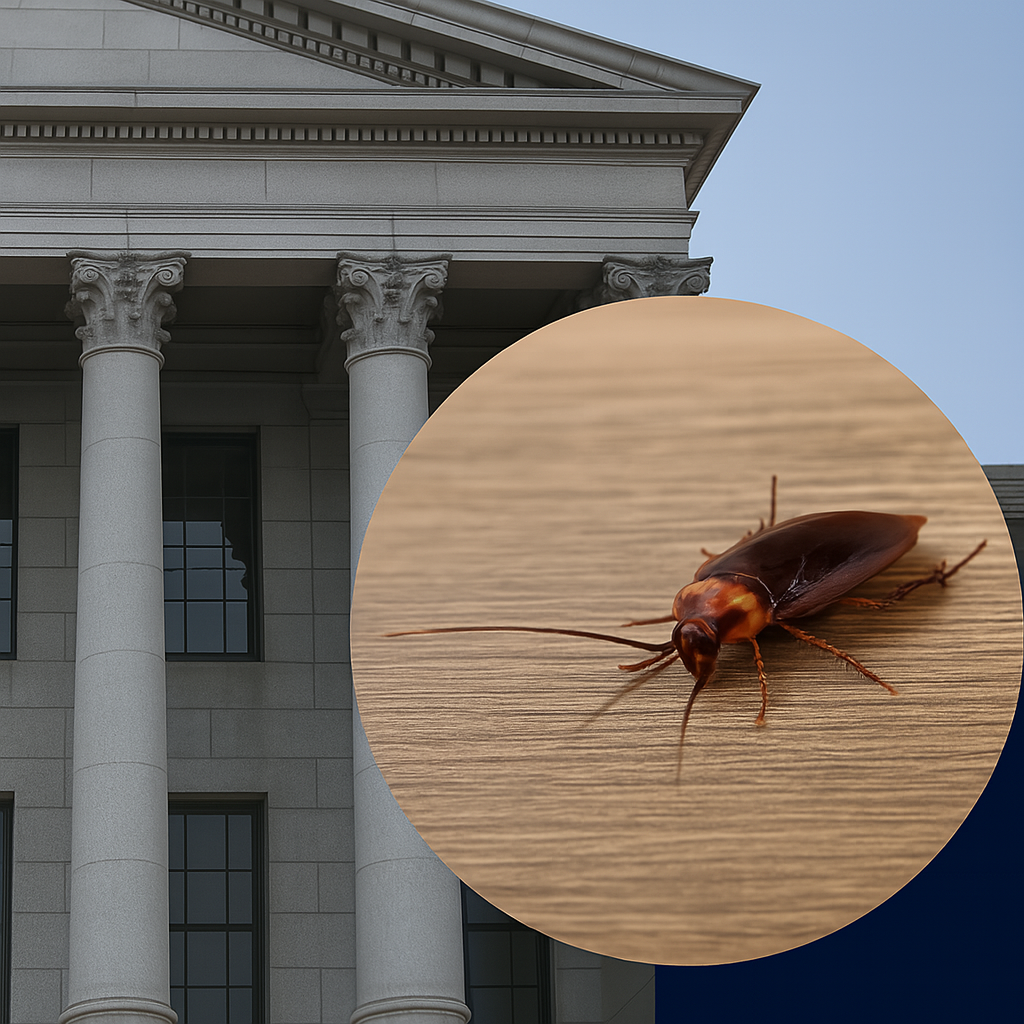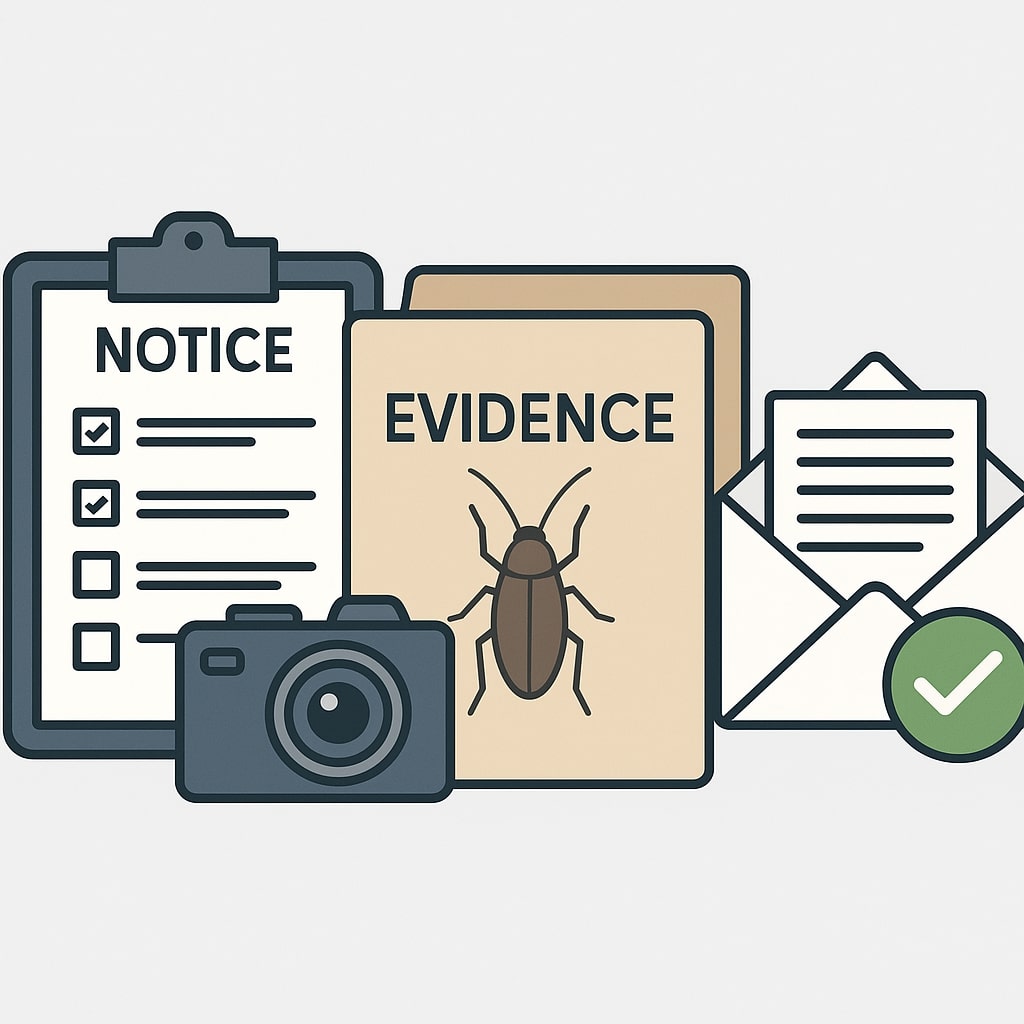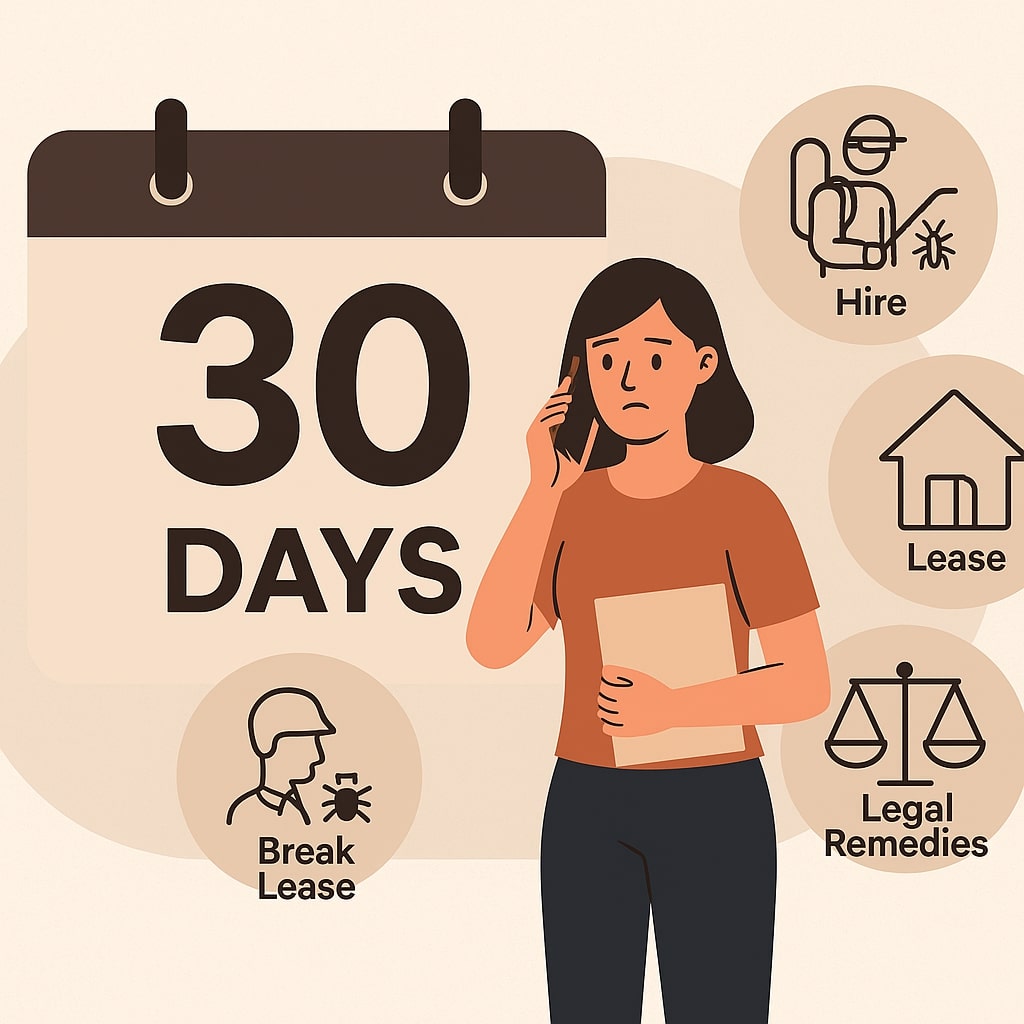Can You Sue Your Landlord for a Cockroach Infestation in California?
Is your landlord failing to deal with cockroaches in your apartment? You may be entitled to compensation.
Legal Help for Tenants Facing Roach Infestations

Cockroach sightings in your apartment may seem minor — until they multiply, spread disease, and jeopardize your health and safety. Under roaches in apartment law California, tenants have the right to live in pest-free, habitable conditions. An untreated roach infestation may qualify as a serious housing violation under California Civil Code §1941.1.
At The Brinton Firm, we’ve helped renters across Los Angeles — from Echo Park to South LA — take action under roaches in apartment law when landlords failed to address infestations. Whether you’re living in Koreatown, Boyle Heights, or Santa Monica, our tenant attorneys in Southern California can help.
Spot treatments like traps or sprays offer only temporary relief. Roaches thrive in walls, plumbing gaps, and shared building spaces — even in clean units. If your landlord hasn’t responded after being notified, it’s time to explore your rights under roaches in apartment law in California and speak with a Los Angeles cockroach infestation lawyer for legal help.
TELL US ABOUT YOUR PROBLEMS
🪳 Steps to Take If You Have Roaches in Your Apartment
Roaches don’t just pose a nuisance — they can endanger your health, violate housing codes, and compromise your legal rights as a renter in Los Angeles. If you suspect an infestation, follow these documented steps to protect yourself and build a strong foundation for legal action if necessary:
1. Notify Your Landlord in Writing
California law requires tenants to give landlords a reasonable opportunity to fix habitability issues. That starts with formal notice.
- Write an email or letter describing the roach problem in detail.
- Include the date you first noticed signs of infestation.
- Be polite but firm: request that the issue be addressed within 30 days.
- Save a copy for your records — it can serve as evidence later.
Tip: If you’re renting in Los Angeles, citing California Civil Code §1941.1 can strengthen your position when reporting pest-related habitability violations.
2. Take Clear Photos and Videos
Documenting the infestation is critical.
- Capture pictures of live or dead roaches, droppings, egg cases, and damaged food or materials.
- Include timestamps or note the date in file names.
- Take footage at different times of day to show the severity and consistency of the issue.
Tip: Visual evidence can support health department complaints or legal claims for damages.
3. Get a Pest Control Inspection Report
Independent validation adds credibility to your claim.
- Hire a licensed pest control company to inspect your unit.
- Ask for a written report that documents the presence of roaches, their breeding areas, and health hazards.
- Include any technician notes or recommendations for treatment.
Tip: If you’re in Los Angeles County and can’t afford a private inspection, contact your local housing authority — some offer free or subsidized services for tenants.
4. Track All Communications and Activities
Maintain a paper trail to prove your diligence and your landlord’s (in)action.
- Save emails, texts, and voicemails exchanged with your landlord.
- Keep a daily log of when you saw roaches, when you contacted your landlord, and any responses or delays.
- Document dates of inspection, pest control treatments, or denied access for repairs.
Tip: Detailed logs often make the difference when proving landlord negligence in Los Angeles courts.
5. Allow Up to 30 Days for Resolution
Under California housing law, landlords generally have 30 days to resolve habitability issues after receiving written notice.
If no action is taken within that period, you may have legal rights to:
- Break your lease without penalty
- Withhold rent (within legal guidelines)
- Hire an exterminator and deduct the cost from rent (within limits)
- File a legal claim for damages or uninhabitable living conditions
Warning: Always consult with a qualified Los Angeles tenant attorney before taking legal steps — acting without guidance could jeopardize your lease or case.

What Constitutes a Roach Infestation?
A roach infestation is more than an occasional bug — it poses serious health risks and may violate your rights under roaches in apartment law California. Roaches can spread disease, trigger allergies, and create legally uninhabitable living conditions, especially in densely populated areas like Los Angeles County.
At The Brinton Firm, we’ve helped tenants across LA understand what qualifies as an infestation under roaches in apartment law. A true infestation involves a sustainable breeding population — cockroaches multiplying out of sight in walls, crawlspaces, or behind appliances. In warm environments like Southern California, infestations can escalate quickly without professional treatment.
If you’re dealing with any of the following signs, your unit may be considered uninhabitable under California Civil Code §1941.1:
- Frequent Sightings: Seeing roaches during the day is often a sign of a serious infestation.
- Droppings: Small dark specs that resemble black pepper or coffee grounds.
- Odor: A pungent, musty smell near cabinets, walls, or drains.
- Egg Cases (Oothecae): Brownish capsules found in dark, moist areas.
- Damage to Property: Chewing on paper, books, cardboard, or even fabric and leather items.
If you’re renting in LA and experiencing these signs, roaches in apartment law in California may entitle you to legal remedies. Speak with a tenant rights lawyer to learn how to protect your health, your lease, and your future.
🏛️ Tenant Rights & Legal Options for Roach Infestations in Los Angeles
Under California Civil Code §1941.1, landlords are legally required to maintain rental units in habitable condition — and that includes addressing pest infestations such as cockroaches. If you’re renting in Los Angeles, your landlord has a duty to respond promptly once notified of the issue.
While response times can vary slightly based on local codes, landlords generally must begin resolving a roach infestation within 24 to 48 hours of notice. In more severe cases, the extermination process may take multiple treatments over several weeks. During this time, landlords must maintain active communication and provide access to pest control professionals.


🚨 What to Do If Your Landlord Refuses to Act
If your landlord ignores or delays action after you’ve reported the infestation, California law gives you options:
-
File a Complaint: Contact the Los Angeles Housing Department (LAHD) or local health authorities. Inspectors can investigate and issue violations if your unit fails to meet habitability standards.
-
Repair & Deduct: If permitted in your area, you may hire a licensed exterminator yourself and deduct the cost from your rent — but only if the cost is less than one month’s rent, and only after written notice and a reasonable waiting period.
-
Pursue Legal Action: A persistent infestation may constitute a breach of California’s “implied warranty of habitability.” You may be eligible to sue for damages or break your lease without penalty.
💡 Important: These actions come with legal risks. Always consult with a Los Angeles tenant rights attorney before withholding rent or taking independent action.
📝 How to Prove You Reported the Infestation
To protect your rights, document every step of your communication with your landlord:
-
Send All Notices in Writing: Use email or certified mail with return receipt requested. Keep copies of everything.
-
Photograph & Record Evidence: Take clear pictures or videos of roaches, droppings, egg casings, and any property damage.
-
Collect Third-Party Confirmation: Statements from exterminators, inspectors, or even neighbors who’ve seen the roaches can serve as additional proof.
-
Track Timelines: Keep a written log of when you sent notices and when (or if) your landlord responded.


⏳ What Happens After 30 Days?
If your landlord fails to act within 30 days of your written complaint, California law may consider the unit uninhabitable. At that point, you may:
-
Hire Your Own Exterminator (if legally allowed) and deduct the expense from your rent — but always retain receipts.
-
Break Your Lease and Move Out if the unit is unsanitary or endangers your health.
-
Pursue Legal Remedies with the help of a tenant rights attorney to recover damages, secure alternative housing, or reclaim your deposit.
📞 Need Legal Help?
If you’re facing an ongoing roach infestation and your landlord refuses to act, don’t face it alone. The legal team at The Brinton Firm specializes in tenant rights and can help you take action while protecting your lease and finances.
👉 Contact us today to schedule a free consultation and explore your options under California housing law.

NO UPFRONT COSTS
Our experienced tenant lawyers in California are committed to helping tenants claim their rights that have been neglected for too long. With decades of experience, we have recovered millions from landlords who fail to provide safe properties as required by law. We aim to empower tenants with knowledge and determination to fight for justice.
FAQs About Cockroach Infestations & Tenant Rights
Are landlords responsible for roaches in California?
In California, landlords have the responsibility to provide habitable living conditions for their tenants, which includes keeping the rental property free from infestations of pests such as roaches. Landlords are required to maintain the rental property in a condition that meets basic health and safety standards, and they must take action to address pest infestations when they become aware of them.
Under California law, tenants have the right to a habitable dwelling, and landlords are required to maintain the premises in a condition that is fit for human occupation. If a tenant reports a pest infestation, such as a roach problem, the landlord is generally responsible for taking prompt action to eliminate the infestation.
If a landlord fails to address a pest infestation in a timely manner, the tenant may have legal remedies available, such as withholding rent, terminating the lease, or suing for damages. However, it is important for tenants to follow proper procedures and document their complaints and communications with the landlord in order to protect their rights.
Contact us for a complimentary consultation to determine whether you may have a viable case.
Can I break my lease because of roaches in California?
Under California law, landlords are required to provide tenants with habitable living conditions, which includes freedom from vermin and pests such as cockroaches. If your landlord has failed to provide you with a habitable living space, you may be able to break your lease.
However, before breaking your lease, you should first notify your landlord in writing of the cockroach infestation and give them a reasonable amount of time to address the issue. If your landlord fails to take action within a reasonable timeframe, you may have a valid reason to terminate your lease.
It’s important to note that breaking a lease can have legal and financial consequences, so you should consult with an attorney or a tenant advocacy group before taking any action. They can provide you with specific guidance on your rights and options as a tenant in California.
Contact us for a complimentary consultation to determine whether you may have a viable case.
Can I sue my landlord for roaches in California?
Under California law, tenants have the right to live in a habitable dwelling that is free from vermin and pests, including cockroaches. If your landlord has failed to provide you with habitable living conditions, you may have the right to sue your landlord for damages.
To pursue legal action, you should first document the extent of the cockroach infestation and notify your landlord in writing of the problem. Give your landlord a reasonable amount of time to address the issue, but if they fail to take action, you may want to consider filing a lawsuit.
Before filing a lawsuit, it’s a good idea to consult with an attorney who is knowledgeable about tenant-landlord law in California. They can help you determine the strength of your case and guide you through the legal process.
If you decide to sue your landlord, you may be able to recover damages for any harm caused by the cockroach infestation, such as property damage or medical bills. You may also be able to recover damages for any expenses you incurred, such as the cost of hiring an exterminator or staying in a hotel while your apartment is being treated.
Keep in mind that pursuing legal action can be time-consuming and expensive, so it’s important to weigh the potential benefits and costs before deciding to sue your landlord.
Contact us for a complimentary consultation to determine whether you may have a viable case.
Do roaches make an apartment uninhabitable?
Roaches can make an apartment uninhabitable if the infestation is severe enough. In California, landlords are required by law to provide tenants with habitable living conditions, which includes freedom from vermin and pests such as cockroaches.
If there is a significant cockroach infestation in your apartment, it can affect your health and well-being in a number of ways. Cockroaches can trigger allergies and asthma, contaminate food, and spread diseases. In addition, the sight of cockroaches crawling around can be unsettling and cause psychological distress.
In cases where the cockroach infestation is so severe that it poses a health hazard or interferes with the tenant’s enjoyment of the apartment, the apartment may be considered uninhabitable. This can give the tenant the right to break the lease or pursue legal action against the landlord.
However, if the infestation is minor and the landlord takes reasonable steps to address the problem, the apartment may still be considered habitable. The key is to notify your landlord of the issue and give them a reasonable amount of time to take action to address the problem.
Contact us for a complimentary consultation to determine whether you may have a viable case.
What to do if my apartment is infested with cockroaches?
If your apartment is infested with cockroaches, here are some steps you can take:
- Notify your landlord or property manager: Contact your landlord or property manager immediately and inform them of the cockroach infestation. Ask them to take action to address the problem as soon as possible.
- Clean and sanitize your apartment: Cockroaches are attracted to food and moisture, so make sure to keep your apartment clean and free of crumbs or spills. Dispose of garbage regularly and wipe down surfaces with a disinfectant.
- Seal any cracks or gaps: Cockroaches can enter your apartment through tiny cracks and gaps. Seal any openings around pipes, windows, and doors with caulk or weatherstripping.
- Use baits and traps: Cockroach baits and traps can be effective in reducing the population of cockroaches in your apartment. Follow the instructions carefully and place them in areas where cockroaches are likely to be.
- Hire a professional exterminator: If the infestation is severe, you may need to hire a professional exterminator. Make sure to choose a licensed and experienced pest control company that uses safe and effective methods.
- Keep records: Keep a record of all your communications with your landlord or property manager about the cockroach infestation, including the date and time of each conversation or email.
Remember that under California law, landlords are required to provide tenants with habitable living conditions, which includes freedom from vermin and pests such as cockroaches. If your landlord fails to take action to address the infestation, you may have legal options such as breaking your lease or suing your landlord.
Contact us for a complimentary consultation to determine whether you may have a viable case.
Contact The Brinton Firm for a Free Consultation

